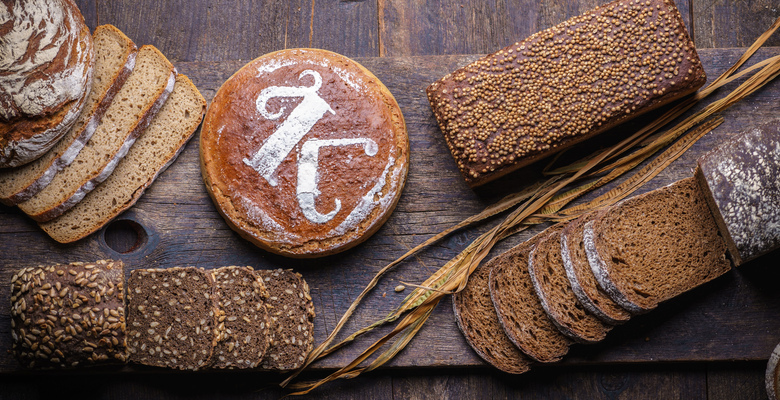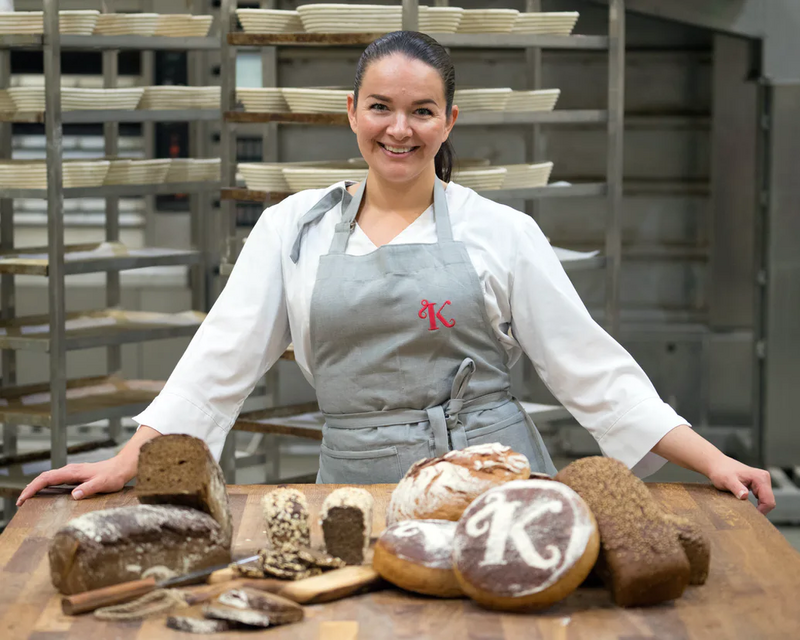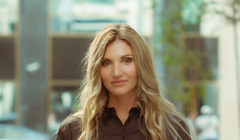
Bread is the staff of life, as the peoples of Eastern Europe say. In this region the bread baking tradition receives special attention, especially when it comes to loaves partially or wholly made with rye flour. The range of ‘grey breads’, as they are known, is not so wide in the UK. Here people mostly eat white sandwich bread. But since the appearance of the bread and baked goods of Amber Bakery and Karaway, the trend has started to shift.
How have these two brands been able to get top star ratings and win themselves the affection of thousands of locals? In an interview with Kommersant UK, Nadezhda Genchas, the co-owner of the Amber Bakery and Karaway brands told us how she set up a premium baking business, gave us insight into the secret of the success and popularity of her products and also told us how of the pandemic and Brexit have affected her business.

Who creates the recipes for the cakes and bread at Amber Bakery and Karaway?
Our business has Eastern European roots. We have drawn on the best traditions of Lithuanian, Russian, Belarusian, Polish and Latvian baking. All our products are originally my ideas which are then perfected and put into practice using our equipment. I have a good understanding of the products and flavours for which there is a demand on the market.
For the Karaway brand we have usually taken the most popular Eastern European recipes and added some modern, Western touches and tastes. We have developed a wide range of sourdough breads, as well as breads with added spices, seeds, nuts and dried fruit. For example, for Christmas we launched a new rye bread with cranberries, walnuts and aromatic Christmas spices like you find in mulled wine. Also we took some traditional English pastries, replaced the wheat flour with rye and added caraway seeds, as well as producing the classic Eastern European apple Charlotte in the form of a muffin to suit English tastes.
As for cakes, our headliners are the Napoleon cake and the Medovik honey cake, which we still make according to Soviet specifications. We also have in our assortment several different variations of Medovik, one with caramelised batter, (it has a more intense honey taste), and another with added walnuts. English customers love them, it’s no wonder that the cake got three stars in 2019 and 2021 in the Great Taste Awards.
How do you manage to win the sympathy of the jury year after year?
In 2011, the first year after we launched the Karaway brand, we sent twelve of our products to the Great Taste Awards. They’re one of the most famous British culinary competitions. It’s not just open to local companies, producers from other European countries also take part. There are lots of judges, each tries the product and awards it points. The points add up, or are ‘combined’ to make stars. One product can receive a maximum of three gold stars. In the very first competition, the traditional Lithuanian rye bread from our bakery got the highest reward. It also got into the UK top ten best foods of the year in 2012. We weren’t expecting to receive anything at all, but then we won another nine stars. Over the ten years since the Karaway brand was established, we have won the highest number of stars of any English baker - 108 for 26 products.
Eastern European immigrants (and others too) consider British bread surprisingly unappetising, even lacking taste. As a baker, do you consider this criticism fair? Why do you think so many people say this?
Rye bread plays a more important part in the culinary culture of people from the former Soviet Union than it does for the British. While Eastern Europeans tend to eat everything with a spoon in one hand and a piece of bread in the other, here it’s just a basis for a sandwich, which is why the local bread doesn’t have a particularly distinctive taste. The popularity of rye bread in Eastern Europe is due to climatic conditions, as rye grows well in this region and produces bigger harvests than wheat. In Britain, they’ve only recently begun to grow rye at any scale, and the volumes are still small. For the English, the term ‘rye bread’ has hard, sour associations, because, until recently, bakers here haven’t really known how to make it. Historically, in England rye bread was the food of the poor, while the better off ate wheat bread. This trend has only really changed in the last 15 years, and you might say that we’re one of the reasons for this shift, as the awards our products have received testify. English customers affirm it; they’d never suspected that rye bread could be so good.
Rye bread is becoming ever more popular in Britain because it’s so good for you. Concern about healthy eating is rising, and at the same time the number for people suffering from gluten allergies is also increasing rapidly. This allergic reaction is generally due to wheat gluten, specifically to certain proteins which modern, genetically modified wheat contains. In pure rye bread, there is also gluten (although in significantly lower levels), but this gluten has quite different properties. For instance, rye gluten doesn’t inflame the gastrointestinal tract. Of course this doesn’t apply to people who are completely gluten intolerant and have coeliac disease. These people, who make up about 2% of the global population, can’t eat any gluten at all, and that includes rye gluten.
The consumption of rye bread also helps weight loss, since it contains five times more fibre, does not cause sudden spikes in blood sugar and keeps you feeling fuller for longer. There has also been research confirming that consumption of rye bread improves the health of the cardio-vasuclar system and prevents some forms of cancer. In the Karaway range we have a wide range of wholemeal, sourdough and sugar free bread.

How many retailers stock your products? Could you describe your product range? What’s your strategy for attracting new clients? Do you use online marketing? How has your business changed during the pandemic? Do you do much online?
Amber Bakery operates in the B2B segment, we supply our products to about 300 clients (mostly they are Eastern European shops). This brand has more than 120 types of baked goods in its range, you can now buy them from London to Kent and Manchester. They are also widely available in Scotland.
Karaway has roughly the same number of partner companies. About 100 different products are sold under this brand. A significant portion of the production is sold retail at our flagship store in Stratford, and at our stall on Borough Market. Karaway products are also available at weekend farmers’ markets in central London and in Selfridges. Several of them are on sale at Harrods and the Whole Foods Market. Quite large volumes of this brand go to the hospitality industry.
As for online sales, we’d started developing this area before the pandemic started. Practically the entire Karaway range is available at our online store (karaway.com). Additionally, Karaway branded products are available from large internet platforms like Ocado, Amazon and Farmdrop. Thanks to online delivery, you can buy the main Karaway range all over Britain. Our own online store helped quite well to compensate for the losses our off-line business suffered during lockdown. We conducted a large marketing campaign to promote it, with advertising on social media. And although offline retail isn’t going anywhere, online trade is the future.
Of course, some aspects of our business are challenging to adapt to online delivery. For example bread, buns and biscuits are ok, but it’s hard to deliver cakes. There’s no specialised home delivery for delicate items like this on the market. Our cakes are different from traditional English recipes because they’re airy and succulent, and they need to be kept in a fridge. We only deliver cakes to shops, we don’t offer home delivery for them yet.
Despite all these achievements, the online share of our sales is still quite modest, at 10% of the total volume. During the lockdowns, this proportion trebled, but after restrictions were lifted, it dropped off significantly, returning to its previous rate. Our products are not so straightforward to advertise online, you have to see them and try them first.
Why are your baked goods not on sale in supermarkets like Tesco and Sainsbury’s?
So far these chains haven’t shown any interest. They’re largely oriented towards the mass market, and that’s not our segment. We produce premium products, so we’re working on getting them stocked in Waitrose.
You founded Amber Bakery in 2005, and since 2011 you’ve been developing another brand, Karaway, which is now over ten years old. Did you approach the two brands differently?
When we founded the company, we didn’t quite understand our target audience. At first we planned to sell Amber Bakery goods to English consumers as well as to Eastern Europeans. However, with time we realised that these two segments have such diverging tastes that they require different approaches.
When we created the newer brand, we chose a name predominantly with English consumers in mind. Caraway is one of the main spices used in recipes for our breads. The name also appeals to Russian speaking customers (karavai is a traditional Eastern European bread served at weddings, so it is a symbol of celebration and hospitality). To introduce locals to the Karaway brand, we created a tasting table where you could try our entire range of products. The pandemic, of course, put an end to that, but this form of promotion was very effective. We also printed cards with information about the history and traditions associated with rye bread, its nutritional qualities and benefits for health, and explaining what you could eat it with. This was a very important element of our marketing in the early stages of developing the new brand.

Who are your main suppliers? Have you encountered any staffing shortages since Brexit, or suffered any disruption to your supply chains?
We work with the best Lithuanian and English producers and distributors. We import five different types of rye flour from Lithuania, these goods are simply not produced in the UK. Deliveries are regular, every fortnight we import 24 tons of different ingredients, including rye flour, caraway and poppy seeds, as well as dried rushes which are gathered by Lithuanian farmers.
As for Brexit, it’s true that we were concerned about delays at the border, so at first we tried to buy up stocks well in advance. However our fears weren’t justified, there were no long hold ups to shipments. But what did affect us was the cost of delivery. That’s tripled now. Prices for ingredients have also gone up significantly. The total cost of materials and delivery have risen 30%. In April of last year we raised prices, but not by much, only 3%-5%. Since then, the prices of ingredients, packaging, fuel, gas, and many other things have continued to grow relentlessly, so we’ll have to put up prices again. Most of all, Brexit has affected the growth of wages and the availability of staff. You get the impression that the workers have just left the market. Many immigrants from the European Union have left England and gone home, not just because of Brexit but also because of the effect of the pandemic. Previously, before Brexit, every week a huge number of new workers arrived in Britain, but now they just don’t. That’s the main problem now for a lot of businesses. We have 80 members of staff at our company. The main team of highly qualified specialists hasn't changed, many of them have been working for the company since it was founded. At the same time, we have some turnover amongst staff in ancillary, lower skilled roles.
Will the karavai and the medovik conquer the world one day, like the French baguette has done? If so, what’s needed for this to happen?
Well, we’re in with a chance! The medovik honey cake especially might have what it takes. To start with, it’s got a universal taste. It’s popular with a very diverse range of customers, which the number of awards it’s received attest to. The name Honey Cake appeals well to an international audience. As for our rye bread, which has even more awards, it will probably need more time to win mass recognition.
We don’t plan to enter the markets of other countries in the short tem, we still see a lot of potential to develop our brands in Britain. Also, the high quality of our products means that we can’t spread ourselves out too thinly. As I said, we’re currently working on getting our products onto the shelves of Waitrose, and building up our clientele. We’re also considering offering franchises for a chain of Karaway café-bakeries.
Interviewed by Alena Ivanova






